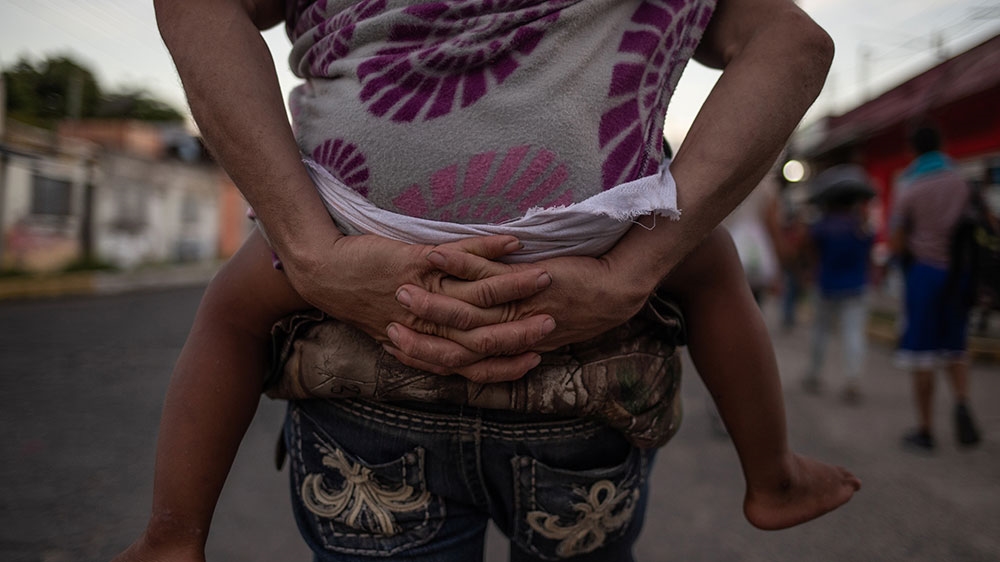
Tonala, Chiapas, Mexico – Resting in the shade of a row of trees, Orvelina Lizeth Melendez reached into her purse, pulled out a small, clear plastic bag and carefully removed her husband’s death certificate. The tattered paper travelled nearly 1400km with her from her hometown of Tegucigalpa, Honduras to Tonala in Chiapas, Mexico.
“They killed him right in front of me,” Melendez said, recalling the moment gang members burst into her family’s home more than three years ago.
Melendez was pregnant and she and her four children were at home asleep at the time.
The death certificate includes very little information. Fredis de Jesus Ferrera Lemus. Age 31. National identification number. Parent’s names. Date and location of death. The cause of death is listed as “violent”, and underneath it, the document briefly expands on the cause, stating that it was craneofacial trauma from a gunshot wound.
But the document could become vitally important as she makes her way to the US border to apply for asylum.
Melendez is one of thousands of Honduran and other Central American migrants and refugees on a US-bound caravan currently in southern Mexico.
She has no idea why her husband, a garbage truck worker, was killed, and she does not expect to ever know. Ninety percent of homicides in Honduras go unsolved.
“It was left at that. When you’re poor, deaths remain in impunity. It is a very dangerous neighbourhood,” Melendez said.
Violence, poverty, health
Many Hondurans are fleeing violence, whether it is gang related, political, or for other reasons. Many are also looking to leave a life of poverty and unemployment. And some migrants and refugees are fleeing because they or their children suffer from disabilities or health conditions that require attention they are unable to obtain in Honduras.
Melendez left for all three of those reasons. Her brother Jimy, who is also travelling with the group, suffers from speech and hearing problems. The cause is unknown and gang members have been trying to recruit the 28-year-old.
One of Melendez’s sons also has special needs due to a primary immunodeficiency health condition, diagnosed two years ago. Now six years old, Joshua Eliel Ferrera Melendez has juvenile onset Still’s disease. A form of systemic arthritis with no known cause, the disease affects the entire body, sometimes including internal organs.
Along with her husband’s death certificate, Melendez also carries a clinical summary of Joshua’s condition and treatment.
The main reason I am travelling today: to give my children a better life and to better feed my family in Honduras.
Orvelina Lizeth Melendez , Honduran asylum seeker
There is no known cure for Still’s disease, but managing the condition requires ongoing treatment. Joshua requires several medications, but the main treatment is human immunoglobulins administered intravenously every month at the hospital. Manufactured from blood plasma, immunoglobulins contain antibodies Joshua lacks.
“My son is very special and I do not have the means to give him the medications. The medicines are very expensive,” Melendez said, her voice slightly cracking.
Melendez was forced to leave Joshua, along with three of her other children, with her mother. She said there’s no chance he would have survived the journey.
For Melendez, finding work in the US is the best option for making enough money to support her family and provide for Joshua’s care.
Hospital Escuela, the public hospital where Joshua receives his treatment, has been chronically understaffed and under-equipped for years. The building leaks, it is nearly always over capacity and patients and their relatives often have to go elsewhere to purchase medications and basic supplies for procedures, including syringes.
Sometime Hospital Escuela has the human immunoglobulins Joshua needs, but sometimes it does not. Each monthly treatment is $830 and the hospital asks Melendez to pay for a quarter of the cost.
Although doctors and social workers sometimes help with the cost, Melendez questioned how a single mother of five was supposed to earn $200 for treatment, in addition to providing for her family.
“That’s the main reason I am travelling today: to give my children a better life and to better feed my family in Honduras,” she said.
‘We’re not criminals’
Melendez, along with her other family members in the caravan, including Jimy, have heard bits and pieces of US President Donald Trump administration’s characterisation of the migrant caravan, as well as the measures the US government is taking to stop them from crossing the border from Mexico.
Earlier this week, the administration announced more than 5,000 US military troops are being sent to the border in preparation of the caravan. Trump said on Wednesday that number could grow to more than 15,000.
Those troops will likely meet a fraction of the caravan participants, most of whom are only carrying a small bag on a their back. Melendez brought a small bag and now also has a few things stashed in the back of a stroller donated along the way. Most of her belongings, including the stroller, are to clothe and care for her four-year-old daughter she brought with her.
 |
| A Honduran man carries his two-year-old child while walking with a caravan en route to the United States [Adrees Latif/Reuters] |
The caravan is also still more than 1,000km away. And those who do make it, plan on applying for asylum at an official port of entry.
Despite the threat, Melendez and most of the others are undeterred.
“We are not criminals. We are not going to commit crimes. We just want to go work,” she said.
“We are going to continue. We are going to head north.”












